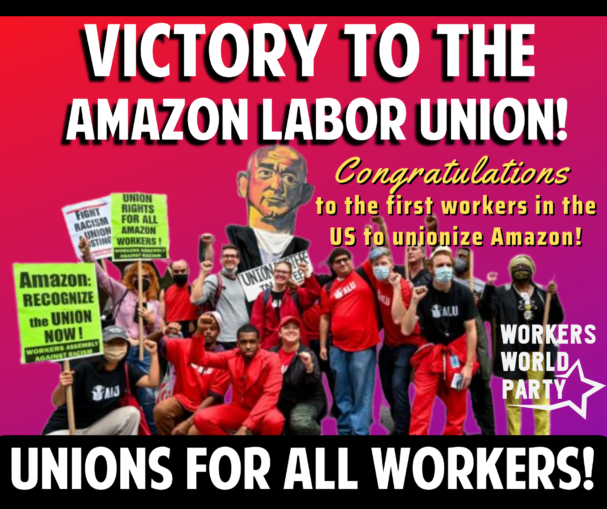On one-year anniversary of ALU’s historic victory, New York Times does hit job on the union

A year ago, the Amazon Labor Union (ALU) surprised and excited the labor movement and shocked the ruling class with the first union victory at Amazon. The New York Times, one of U.S. capitalism’s foremost mouthpieces, has marked the anniversary with a front-page hit job on the union, entitled “Strains emerge inside the union that beat Amazon.”
The Times article asserts that there are two factions in the Amazon Labor Union. The article contends that the faction led by ALU leader Chris Smalls is more focused on building ALU chapters at Amazon facilities across the country than securing a contract at the main Amazon warehouse on Staten Island, whereas the faction opposed to Smalls wants to prioritize the struggle for a contract.
To begin with, the effort to expand Amazon worker organizing from coast to coast while fighting to win a contract for the ALU on Staten Island are in no way mutually exclusive strategies.
In fact, fighting to expand Amazon worker organizing everywhere while fighting to win a contract on Staten Island are dependent on each other. There are many complex questions in all of this. Is the rank-and-file character of the organization still prioritized? Is there too much reliance on premature National Labor Relations Board (NLRB) union elections?
The NLRB is not neutral. It represents the capitalist government. A hugely important issue that may be getting lost in all of this is that the ALU has been, since its inception, a Black-led union in a company that employs largely Black and Brown workers. If the political importance of this is underestimated or negated, it can only have negative consequences.
It is possible for the ALU on Staten Island to win a contract based primarily on preparing the workers to do what is necessary, including striking. But this is going to be a big drawn-out fight. At the core of Amazon’s strategy to destroy the ALU and crush all Amazon worker organizing everywhere is to never, ever sit down and negotiate with the ALU in Staten Island — even though the NLRB has finally acknowledged that the ALU is the legal representative of Amazon workers, after Amazon campaigned for nearly a year to prevent this.
More solidarity, not less
The more reliable way of forcing Amazon to deal with the ALU is through a solidarity campaign, centered in the labor movement, that is so widespread, so serious and militant that it constitutes a virtual workers’ rebellion in support of Amazon workers. The creation of this level of solidarity is the biggest political challenge for the fight to organize Amazon. The biggest political problem up to this point has been the lack of a strong, public and mass solidarity campaign with the Amazon workers’ struggle, coming from the labor movement.
The incredible grassroots Starbucks organizing campaign faces the same problem. In 2023, there must be a real, game-changing solidarity campaign from organized labor, involving the entire labor movement, the community, the Black movement and the left. This is the only way that these heroic workers at Amazon, Starbucks and elsewhere can realize the potential of transforming the whole workers’ movement.
These worker-organizing campaigns have received applause and some resources from parts of organized labor. No one can deny that this support has been important. In addition to the ALU, other Amazon worker organizing groups — like the Retail, Wholesale and Department Store Union (RWDSU), the Carolina Amazonians United for Solidarity and Empowerment (CAUSE) and Amazonians United — have made important progress over the last year. The Teamsters have also vowed to organize Amazon workers.
However, given the world-changing potential of these organizing drives versus the multimillion-dollar war that Wall Street has launched to bust these organizing drives, the solidarity from labor so far amounts to little more than a drop in the bucket. Although at least a half a dozen unions, including the RWDSU and the Teamsters, have been either involved in Amazon worker organizing or making plans to get involved and talking with each other about this goal.
Labor must throw everything it has into the upsurge in worker organizing and do so without taking over these campaigns and usurping their rank-and-file leadership. It must make 2023 the turnaround year.

